
Rogozina_up2
.pdf
III. VOCABULARY
1. a car showroom [ʃo͟ʊru:m] |
|
автосалон |
|
2. interview ['ɪntəvju:] |
|
cобеседование |
|
Jake is telling Sylvia about his |
|
Джейк рассказывает Сильвии о |
|
interview for a job in a car showroom. |
|
собеседовании по приему на работу |
|
|
|
|
в автосалон. |
3. clothes [kləuðz] |
|
одежда |
|
4. employee[ˌemplɔɪ'i:] |
|
служащий, сотрудник |
|
Employees must wear clean, smart |
|
Сотрудники должны носить чистые |
|
clothes while they are at work. |
|
деловые костюмы на работе. |
|
|
|
||
|
|
|
|
5. jeans [ʤi:nz] |
|
джинсы |
|
|
|
|
|
6. trainers ['treɪnəz] |
|
кроссовки |
|
They mustn’t wear jeans or trainers. |
|
Им запрещается носить джинсы или |
|
|
|
|
кроссовки. |
7. meal [mi:l] |
|
приѐм пищи; еда |
|
to eat / to have a meal |
|
есть |
|
to order a meal |
|
заказывать еду |
|
to serve a meal |
|
подавать еду |
|
8. canteen [kæn'ti:n] |
|
буфет, столовая (в школе, на заводе) |
|
They must eat all their meals in the |
|
Они должны питаться только в |
|
canteen. |
|
столовой. |
|
|
|
|
|
9. soft drink |
|
безалкогольный напиток |
|
10. |
workstation ['wɜ:kˌsteɪʃn] |
|
рабочее место |
|
They mustn‟t have anything but |
|
Им нельзя пить ничего, кроме кофе, |
|
coffee, tea, or soft drinks at their |
|
чая или безалкогольных напитков на |
|
workstations. |
|
своих рабочих местах. |
11. |
hair [hɛə] |
|
волосы |
|
Her hair is beautiful. |
|
У нее красивые волосы. |
12. |
neat [ni:t] |
|
аккуратный, опрятный |
|
They must keep their hair clean and |
|
Волосы должны быть чистыми и |
|
neat. |
|
опрятными. |
13. |
to tie [taɪ] |
|
завязывать, связывать |
|
to tie back one‟s hair |
|
завязать волосы сзади |
14. |
shoulder ['ʃəuldə] |
|
плечо |
|
|
|
|
15. |
to be clean-shaven ['kli:n'ʃeɪvən] |
|
быть гладко выбритым |
All the men must be clean-shaven. |
|
Все мужчины должны быть гладко |
|
|
|
|
выбриты. |
16. make-up ['meɪkʌp] |
|
косметика, макияж |
|
|
to wear make-up |
|
накладывать макияж |
|
The women mustn‟t wear too much |
|
Женщины не должны быть слишком |
|
make-up. |
|
сильно накрашены. |
|
|
62 |
|

|
17. |
to avoid [ə'vɔɪd] smth |
|
избегать ч-л |
|
|
|
|
|
|
|
|
|
|
|
||
|
18. |
altogether [ˌɔ:ltə'geðə] |
|
в общем, в целом |
|
|
||
|
|
But they needn‟t avoid make-up |
|
Но |
нет |
необходимости |
и |
|
|
|
altogether. |
|
отказываться от макияжа. |
|
|
||
|
19. |
polite [pə'laɪt] |
|
вежливый, любезный |
|
|
||
|
|
|
|
|
|
|
||
|
20. |
сourteous ['kɜ:tɪəs] |
|
обходительный, учтивый |
|
|
||
|
Employees must be polite and |
|
Работники должны быть вежливы и |
|
||||
|
сourteous to the public. |
|
обходительны с посетителями. |
|
|
|||
|
21. |
abuse [ə'bju:s] |
|
оскорбления; брань |
|
|
||
|
|
to tolerate ['tɔləreɪt] abuse |
|
выносить, терпеть оскорбления |
|
|
||
|
|
They needn‟t tolerate abuse. |
|
Им не нужно терпеть оскорбления. |
|
|
||
|
22. |
to deal [di:l] with smth |
|
заниматься (решением проблемы) |
|
|
||
|
|
They must immediately call |
a |
Они должны сразу же позвать |
|
|||
|
|
manager to deal with it. |
|
менеджера, чтобы он занялся этим. |
|
|
||
|
23. |
sound [saund] |
|
1. звук 2. смысл, содержание (чего-л. |
|
|||
|
|
|
|
услышанного, прочитанного и т.п.) |
|
|
||
|
|
I didn‟t like the sound of it! |
|
Мне не понравилось то, что я |
|
|||
|
|
|
|
услышал. |
|
|
|
|
|
|
|
|
|
||||
|
|
IV. COMPREHENSION CHECK |
|
|
||||
|
|
|
|
|
|
|
|
|
1.ANSWER THE QUESTIONS:
1.What kind of clothes must employees wear while they are at work?
2.Where must they eat all their meals?
3.In what condition must they keep their hair?
4.What must all men do?
5.What must women do about their make-up?
6.How must employees treat the public?
7.What must employees do if they find themselves in a difficult situation?
2.SAY IF THE SENTENCES ARE TRUE OR FALSE. CORRECT
THE FALSE ONES
1.Employees must wear jeans and trainers at work.
2.They must eat all their meals at their workstations.
3.They mustn‟t have coffee, tea or soft drinks at their workstations.
4.They must keep their hair clean and neat.
5.Women must wear much make-up.
6.All men must be clean shaven.
7.Employees must be rude to the public.
8.Employees must immediately call their parents if they find themselves in a difficult situation.
63
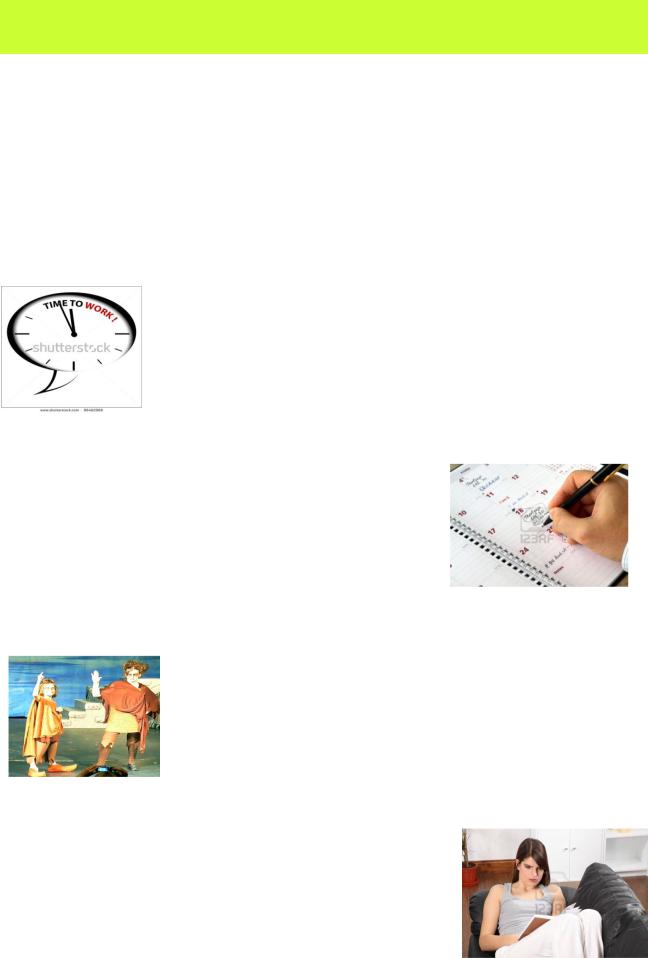
V. GRAMMAR: MODAL VERB MUST
(МОДАЛЬНЫЙ ГЛАГОЛ MUST)
Модальный глагол MUST имеет только одну временную форму: настоящего времени – must [mʌst] (полная форма); [məst] (редуцированная форма) (должен, обязан, нужно и др.). Значения этого модального глагола во многом определяются формой предложения – утвердительной, вопросительной или отрицательной.
В УТВЕРДИТЕЛЬНОМ ПРЕДЛОЖЕНИИ МОДАЛЬНЫЙ ГЛАГОЛ MUST ОБОЗНАЧАЕТ:
1. обязанность, приказание, приказ (переводится, как должен, обязан):
You must be in time for work.
Вы должны вовремя приходить на работу.
2. внутренне осознанную необходимость (переводится, как надо, нужно,
необходимо, должен):
I must do it today, I can’t leave it till tomorrow.
Я должен сделать это сегодня, я не могу отложить это на завтра.
3. настоятельный совет или приглашение (переводится, как обязательно должен, обязательно нужно):
You must see this performance. It’s very interesting.
Вы обязательно должны посмотреть этот спектакль. Он очень интересный.
4. вероятность, предположение (переводится, как должно быть):
She must be at home.
Она, должно быть, дома.
64
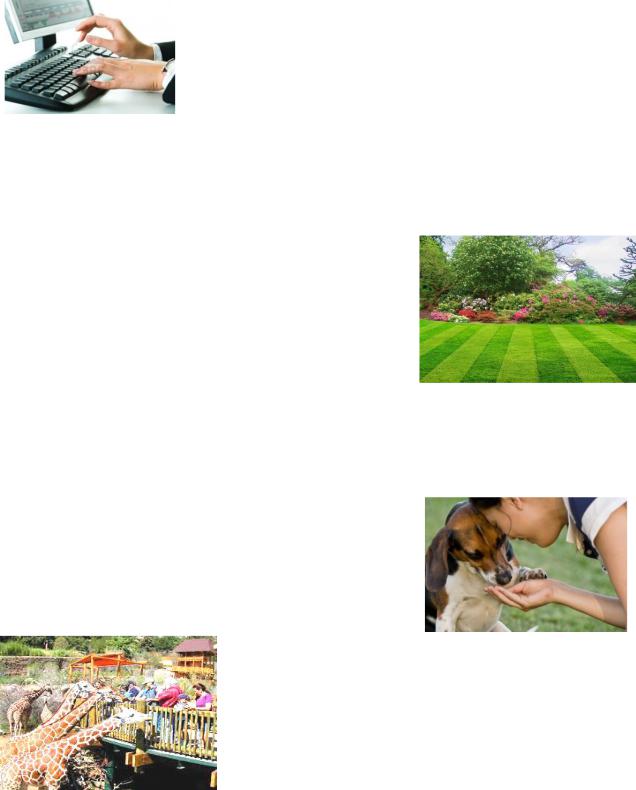
В ВОПРОСИТЕЛЬНОМ ПРЕДЛОЖЕНИИ МОДАЛЬНЫЙ ГЛАГОЛ MUST ОБОЗНАЧАЕТ:
1. нежелание выполнять действие (переводится, как обязательно ли):
Must I type the letters today?
Обязательно ли набирать письма сегодня?
В ОТРИЦАТЕЛЬНОМ ПРЕДЛОЖЕНИИ МОДАЛЬНЫЙ ГЛАГОЛ MUST ОБОЗНАЧАЕТ:
1. категорический запрет совершить действие (переводится, как нельзя,
запрещается):
You mustn’t walk on the grass.
Запрещается ходить по газону.
Отрицательную форму модального глагола MUST – MUSTN’T необходимо отличать от отрицательной формы модального глагола NEED (нужно) – NEEDN’T. Если mustn’t означает «нельзя, запрещено», то needn’t означает «нет необходимости». Сравните:
You needn’t feed the dog. I’ll do it.
Тебе не нужно кормить собаку. Я сделаю это сама.
Visitors mustn’t feed the animals.
Посетителям запрещается кормить животных.
65

VI. EXERCISES
1.Point out the meaning of the verb must in each sentence.
1.It is impossible to do anything in such a short time. I must ask the chief to put off my report. 2. You must do everything I tell you. 3. You must see this movie. It‟s a real blockbuster. 4. I am very tired – I feel I must go to bed at once. 5. We can't wait for them any longer, we must ring them up. 6. I am thinking hard, trying to find a solution to the problem. There must be a way out. 7. I doubt if I can
finish the work in time, but I must do it. 8. You must come and see our new office. We really enjoy working there. 9. Children must go to school every day. 10. You mustn't go out alone at night. 11. We haven't got much time. We must hurry. 12. Tom is very tired. He must work very hard. 13. Must I stay at work late today? 14. You mustn’t play with matches. It is dangerous.
2. Translate the sentences.
1. You must work hard at your English. 2. You must learn the words. 3. Must we learn the poem today? 4. It must be very difficult to learn Chinese. 5. You must not talk at the lessons. 6. Everybody must come to school in time. 7. Don't ring him up: he must be very busy. 8. You must not make notes in the books. 9. I must help my mother today. 10. Don't worry! This is not important. - Not important! You must be joking! 11. You must meet him. He is a very interesting person. 12. You must not argue with the boss. 13. She must stop eating much and she must lose weight. 14. You must stop smoking! If you don't, you're going to have serious problems with your lungs some day.
3. Use the verb must as in the model and translate the sentences.
Example: Tim can lift anything (strong). – He must be strong.
1. Sam worked very hard today (tired). 2. Jack spends a lot of time in the library (intelligent). 3. She is having a third glass of soda (thirsty). 4. She has a big house and a Mercedes (rich). 5. He doesn't like to work (lazy). 6. Nancy is always ready to discuss anything (clever). 7. Albert is eating a third hamburger in a row (hungry). 8. Ann takes three showers a day (cleanly). 9. Barney found a ten-dollar bill (happy). 10. Everybody laughs at him no matter what he does (clumsy).
4.Fill in the gaps with must or mustn't.
1.I haven't got any money. I ......... go to the bank.
2.It's raining. You ................... go out without your umbrella.
3.The road is busy. You ................... look carefully before you cross it.
4.You .................. play football in the house, Jack.
5.My tooth hurts. I ...................... go to the dentist.
66
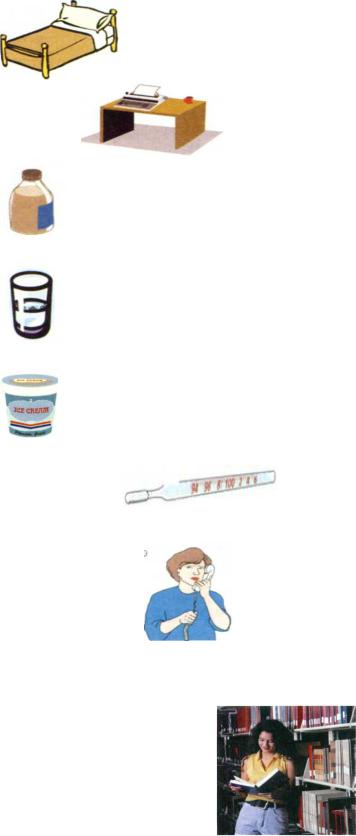
5. Clare has got a cold. She has gone to the doctor's. Look at the prompts and say what the doctor advises her to do or not to do.
stay in bed
You must stay in bed.
go to the office for three days
take some medicine
drink a lot of water
eat any ice-cream
take your temperature twice a day
call me if you have a high temperature
6.Read the Library Rules and say what you must and what you mustn’t do when you are in a library.
LIBRARY RULES
1.Don't make any noise.
2.Be quiet.
3.Don't eat or drink.
4.Be careful with the books.
5.Don't leave books on the tables when you leave.
6.Put the books back in the right place.
67
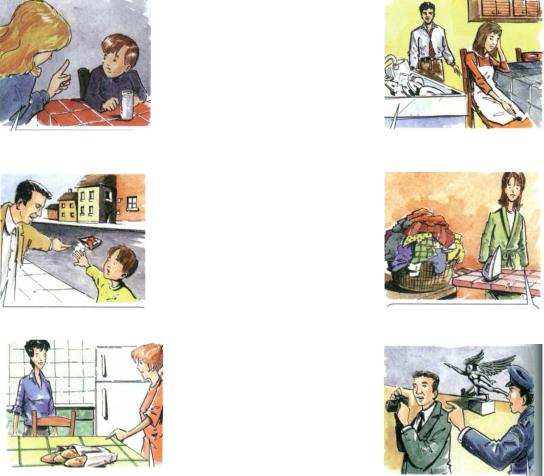
7. |
Fill in the gaps with mustn't or needn't. |
|
1. |
You |
................. play with matches. It's dangerous. |
2. |
You ............ |
talk loudly. The baby is sleeping. |
3. |
I .............. |
go to the bank. I've got some money. |
4. |
We ................... |
stay out late. We have to get up early tomorrow. |
5. |
You ................. |
feed the dog. I'll do it. |
6. |
You.................. |
talk during the exam. |
7. |
You.................. |
phone Julia. She's coming here later. |
8. |
You................... |
take your umbrella. It's stopped raining. |
9. |
You.................. |
park here. There's a "No Parking" sign. |
10. You |
.................... come with me. I can go alone. |
11. You |
..................... lose the key. I haven't got another. |
12. You |
...................... tell Sonia. It's a secret. |
13. You ................ |
buy a newspaper. You can read mine. |
14. You .................... |
go by taxi. I can take you home. |
8. Fill in the gaps with must, mustn't or needn't.
1. You …… drink your milk. |
2. You ......... |
do the washing-up. I'll do it. |
3. You ......... |
throw litter in the street. |
4. I ........... |
iron all these clothes. |
5. You ......... buy any more bread. We've got a lot.
6.I'm sorry, you .….take photographs inside the museum, sir.
68

9. Fill in the gaps with must, mustn't или needn't.
Boss: Have you typed those letters yet? |
|
Secretary: No, I haven't finished. … Must...I type |
|
all of them this morning? |
|
Boss: Yes, you ................ |
, I'm afraid. |
Secretary: Very well, sir. ................ I also photo- |
|
copy them? |
|
Boss: No, you ................. |
Eric can do that. Just ask |
him. |
|
|
Secretary: OK, I'll do that. Oh, sir. You've got an |
|
appointment with Mr. Lee at 6 o'clock. It's almost 5.30. You ................... |
be late. |
|
Boss: Oh, dear! I forgot. I'll go now. |
|
|
Secretary: Do you want me to call your wife and tell her that you'll be late? |
||
Boss: No, you ...................... |
do that. I'll call her. |
|
10. Use mustn't or needn't with the given verbs.
|
|
paint – buy – forget – phone – be – touch – go – finish |
1. |
I ...... |
Alan. I haven't spoken to him for a long time. |
2. |
You .................................. |
the oven. It's very hot. |
3. |
You...................... |
your work now. You can do it tomorrow. |
4. |
We..................... |
to post the letters. They're very important. |
5. |
We ....................... |
the living room. The walls are very dirty. |
6. |
You ....................... |
shopping today. We've got a lot of food. |
7. |
Tom.......................... |
late for work. The boss will be angry. |
8. |
You ........................ |
any new clothes. You've got enough. |
13. Translate the sentences into English.
А. 1. Я должна упорно работать над своим английским. 2. Ты должен делать уроки каждый день. 3. Вы должны быть осторожны на улице. 4. Мои друзья, должно быть, в парке. 5. Вы, должно быть, очень голодны. 6. Я должен сегодня повидать своего друга. 8. У него есть Ролс Ройс. Он, должно быть, очень богат. 10. Вы не должны опаздывать. 11. Твой брат очень хорошо знает Европу. Он, должно быть, много путешествует. 13. Вы обязательно должны придти к нам на ужин. 14. Мне обязательно приходить на работу в субботу? 15. Вы должны делать то, что я вам говорю. 16. Вы все должны обязательно прочитать эту книгу. Она очень интересная. 17. Я обязательно должен сделать это сейчас? 18. Я должна пойти сегодня в магазин. 19. Здесь нельзя парковаться.
B. 1. Работники должны носить чистую, опрятную одежду. 2. Им запрещается носить кроссовки на работе. 4. Мужчины должны быть чисто выбритыми. 5. Женщины не должны быть сильно накрашенными, но нет необходимости избегать использования косметики. 6. Работники должны быть вежливыми и обходительными с клиентами. 7. Но они не должны терпеть оскорбления. 8. Если возникают проблемы, они должны сразу же позвать менеджера.
69
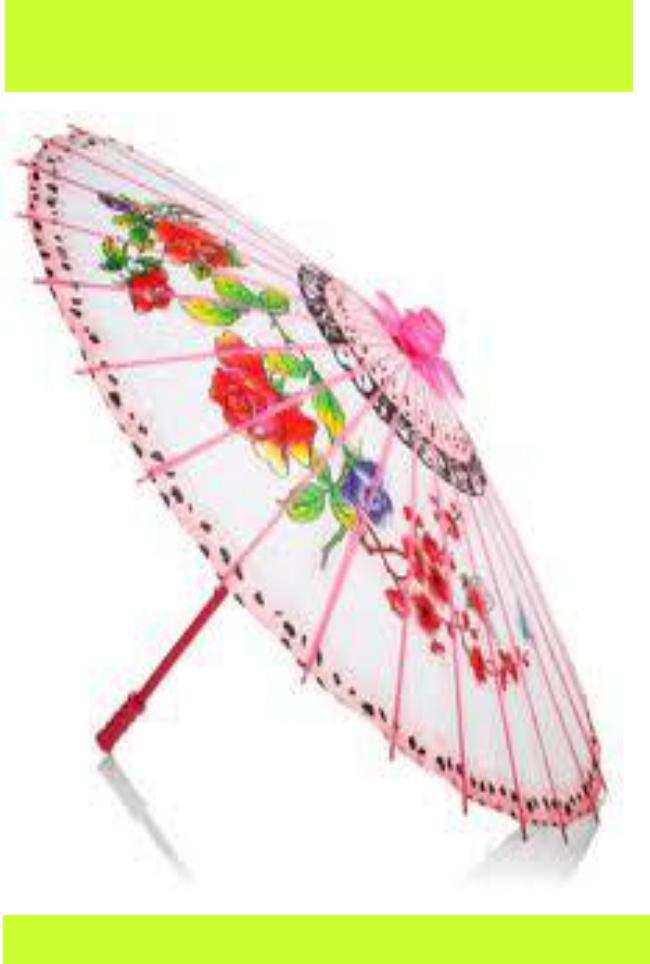
UNIT 6
TRAINING TO BE A GEISHA
70
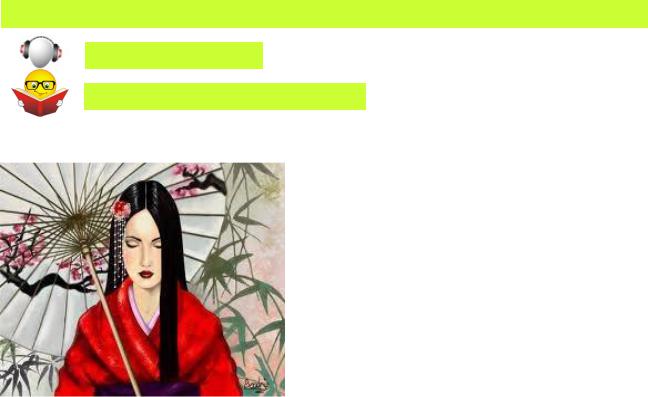
I. LISTENING AND READING
Listen to the text
Read and translate the text
+
TRAINING TO BE A GEISHA
The white face, the dark eyes and hair, the blood red lips – both the Japanese and foreigners are fascinated by these beautiful and mysterious women.
Makiko is training to be a geisha.
Makiko‟s parents wanted her to go to university, study medicine and become a doctor. But they had to accept her choice
because they didn’t have to support her financially. Makiko‟s grandfather paid for her training, he also had to buy the kimonos she needed.
It‟s very expensive to become a geisha. You have to spend a lot on kimonos because you have to have a different kimono each month of the year, and today a kimono can cost three million yen, it‟s about $25,000.
It‟s a hard life for Makiko. She has to leave her family and move into a special boarding house called a “maiko house”. Here, she has to learn traditional Japanese arts such as playing instruments, the tea ceremony, flower arranging, singing and dancing, literature and poetry. She has to take a lot of difficult tests and exams. Only the best will pass all the tests and become geishas many years later.
When she becomes a geisha she will have to serve customers and entertain them. I will also have to sing and dance, and make conversation.
In Japan today there are about a thousand geishas. They play an important role in preserving Japanese culture and history.
71
